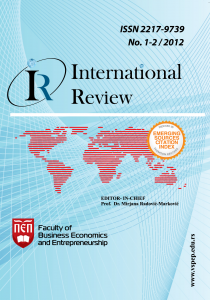New educational strategies versus the traditional methods
New educational strategies versus the traditional methods
Author(s): Mirjana Radović-Marković, Radmila Grozdanić, Goran Kvrgić, Dusan Markovic, Slađana VujičićSubject(s): Economy
Published by: Visoka škola za poslovnu ekonomiju i preduzetništvo
Keywords: Education; new education strategy; traditional model; e-learning; virtual faculties
Summary/Abstract: Education plays an important role in human development by empoweringpeople to improve their well-being and participate actively in nation building.Education and training help to build human capacity for both men and women. It isa key priority area for poverty reduction. The development of contemporarytechnologies, especially the Internet, on the one hand and changes in managementpractice, communication and work organization in companies on the other hand,have in recent years brought about changes in the kinds of knowledge and ways ofacquiring it. In keeping with these, new educational programs, as well as newmodes of studying, everywhere in the world the existing education system is beingredefined and educational programs that have to closely relate to practice arebeing improved. For that sake, “new schools for entrepreneurs and managers” arefounded, which are based on modern programs and courses meant for variousgroups of business people. Very popular are virtual faculties which are found allaround the world and which enable connections between business people andbusiness students with lecturers from all around the world, no matter where theyactually might be. Participating in courses and testing over internet, essentiallychange previous way of gaining knowledge in classical classrooms. This way oflearning contributes to fast information exchange, more access to the newestknowledge and experiences in this domain and save the time and money. Thus, inthis millennium, the classic way of education will be slowly substituted with someother forms of education, in which learning from homes and offices with the help ofcomputers were true. Interactive education should provide a completely newdimension of gaining knowledge and to make it easier for those who attend certaincourses to learn faster and easier.
Journal: International Review
- Issue Year: 2012
- Issue No: 1-2
- Page Range: 23-32
- Page Count: 10
- Language: English

